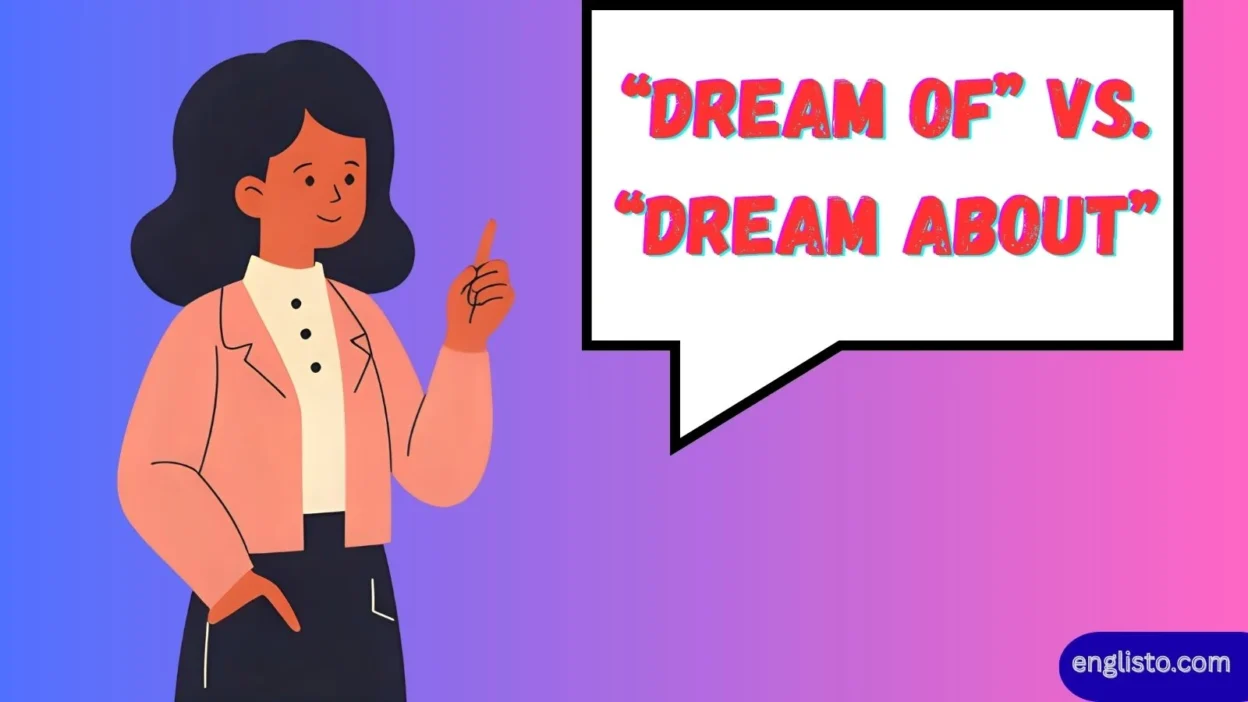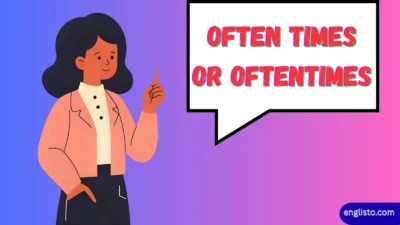Dreams have always fascinated humans whether they’re fleeting night visions, bold aspirations for the future, or deep-rooted desires we carry silently. When we talk about dreams in English, two common expressions come up: “dream of” and “dream about.” At first glance, they might look interchangeable, but the truth is, each phrase carries its own nuance, tone, and emotional weight. “Dream Of” vs “Dream About”.
This guide dives deep into the meanings, grammar, and contexts of both expressions. We’ll look at figurative and literal usage, professional versus romantic tones, and examples from daily conversation, literature, and cultural references. By the end, you’ll have complete clarity on when to use “dream of” and when “dream about” works best.
The Core Difference Between “Dream Of” and “Dream About”
Although both phrases deal with imagination, subconscious visions, or aspirations, the difference lies in specificity, tone, and emotional connection.
| Phrase | Core Meaning | Tone | Typical Usage |
| Dream of | Highlights an aspiration, desire, or cherished hope. | Emotional, poetic, figurative. | “She dreams of becoming a doctor.” |
| Dream about | Refers to an actual dream during sleep or general thoughts/fantasies. | Neutral, conversational, literal. | “I dreamed about flying last night.” |
Think of it this way:
- “Dream of” = Focused and aspirational. It often involves strong emotions, goals, or longings.
- “Dream about” = General and descriptive. It refers to actual dreams at night or simply thinking about something.
Read More: Is It Correct to Say “Deers”? A Complete Guide to Grammar, Usage, and Real-Life Contexts
When to Use “Dream Of”
“Dream of” is the go-to expression when talking about ambitions, goals, or cherished desires. It suggests a deep longing or meaningful aspiration that may or may not be realistic.
Examples of “Dream Of” in Sentences
- “Since childhood, she’s dreamed of performing on Broadway.”
- “He dreams of owning a luxury car one day.”
- “They dream of living on a tropical island after retirement.”
- “Many students dream of studying in Europe to expand their horizons.”
Here, the expression goes beyond sleep. It touches on hope, determination, and emotional investment.
Connotations of “Dream Of”
- Romantic & Emotional: “She dreams of a love that’s unwavering and passionate.”
- Professional & Aspirational: “He dreams of becoming a world-class surgeon.”
- Idealistic & Figurative: “Many dream of a world without wars.”
It’s poetic, idealistic, and highly prized in personal expression.
When to Use “Dream About”
“Dream about” usually refers to what the mind produces during sleep or to casual thoughts about something. It’s more neutral, descriptive, and general.
Examples of “Dream About” in Sentences
- “Last night, I dreamed about winning the lottery.”
- “She often dreams about her childhood home.”
- “I’ve been dreaming about traveling the world for months.”
- “He dreamed about flying through a maze filled with colors.”
Connotations of “Dream About”
- Literal Sleep Visions: “He dreamed about Paris after watching a movie set there.”
- Daily Thoughts & Fantasies: “I’ve been dreaming about owning a new car lately.”
- Past Experiences: “She often dreams about friends and loved ones who’ve passed.”
It leans towards real-life occurrences, casual conversations, and descriptive storytelling.
Figurative vs. Literal Meanings
One of the biggest distinctions lies in whether we’re speaking literally or figuratively.
| Usage | “Dream Of” | “Dream About” |
| Literal (sleep) | Rare, sounds poetic but less natural. | Natural, common. |
| Figurative (aspirations) | Strong, emotional, idealistic. | Possible, but softer. |
| Romantic connotations | Deep, intimate, highly personal. | General affection or encounters. |
| Professional/Goals | Perfect fit for ambitions. | Less commonly used for goals. |
Subtle Nuances and Emotional Depth
- Saying “I dream of you” sounds deeply romantic, expressing longing and attachment.
- Saying “I dream about you” suggests you literally saw someone in a dream, or you think of them casually.
👉 Example:
- Romantic tone: “She dreams of him every night” (deep yearning).
- Literal tone: “She dreamed about him last night” (sleep vision).
This subtle difference can change the emotional weight of a sentence dramatically.
Grammar and Usage Notes
Both expressions use dreamed or dreamt as past tense (both are correct, though “dreamed” is more common in American English).
- Dreamed of → conveys aspirations.
- Dreamed about → conveys sleep experiences or casual thoughts.
Example with tense:
- Present: “I dream of becoming a doctor.”
- Past: “I dreamed of becoming a doctor when I was young.”
- Present: “I dream about flying every night.”
- Past: “I dreamed about flying last night.”
Real-Life Scenarios
Let’s break it down with examples from daily life, literature, and relationships.
Professional Aspirations
- “He dreams of becoming a millionaire through his business.”
- “She dreamed about winning the lottery last night.”
Romantic Relationships
- “She dreams of a love filled with passion and affection.”
- “He dreamed about his ex in a reoccurring pattern.”
Fantasies and Adventures
- “As a young lad, Max dreamed of traveling the world with his dad.”
- “I dreamed about flying over a tropical sea filled with colors.”
Tables of Synonyms and Alternatives
Here’s a quick reference to synonyms that align with “dream of” and “dream about.”
| Expression | Close Synonyms | Example |
| Dream of | Aspire to, long for, desire, yearn for | “She aspires to write a best-selling novel.” |
| Dream about | Think about, imagine, fantasize, envision | “He imagined flying like a bird.” |
How Native Speakers Choose Between Them
- British English often leans towards “dream of” in figurative usage.
- American English uses both but prefers “dream about” for casual speech.
- Choice also depends on personal style and emotional tone.
👉 A novelist may prefer “dream of” for its poetic flair, while in daily conversation, you’ll hear “dream about” more often.
Practical Tips for Mastery
To solidify the difference, try these strategies:
- Observe native speakers in movies, novels, podcasts.
- Experiment in writing: alternate between both to feel the nuance.
- Use mnemonic devices:
- “Dream of = future goals.”
- “Dream about = sleep visions.”
- “Dream of = future goals.”
- Practice with real-life scenarios: write your aspirations using “dream of” and last night’s visions with “dream about.”
Conclusion
Both “dream of” and “dream about” enrich English by offering different shades of meaning. One carries deep, emotional, aspirational connotations, while the other covers literal, descriptive, and casual experiences. Mastering the difference isn’t just about grammar—it’s about expressing yourself with clarity, emotional depth, and precision.
Whether you dream of success or dream about winning the lottery, both phrases give you tools to share your inner world with confidence.
FAQs
Q1: Can I use “dream of” and “dream about” interchangeably?
Not always. “Dream of” is better for aspirations, while “dream about” is better for actual dreams or casual thoughts.
Q2: Which is more romantic, “dream of you” or “dream about you”?
“Dream of you” carries a more romantic, emotional tone, while “dream about you” usually refers to a literal dream.
Q3: Is “dreamt” still correct in English?
Yes, both “dreamt” and “dreamed” are correct. “Dreamt” is more common in British English, while “dreamed” dominates in American English.
Q4: Can I say “I dream about becoming a doctor”?
Yes, but “I dream of becoming a doctor” is stronger and more natural for long-term aspirations.
Q5: Do native speakers notice the difference?
Yes, though in casual conversation, people often use them interchangeably. In writing or romantic contexts, the distinction matters more.



